Ubiquitous Coffee Lab and Coffee Culture _ I just want a cup of coffee
Professional coffee knowledge exchange more coffee bean information please follow the coffee workshop (Wechat official account cafe_style)
The women lit a charcoal fire at the small table, and the coffee beans on the small pan crackled one by one, and white smoke sprang up. When the beans are black and bright, the women skillfully pour the hot beans into a large bowl, mash the beans into powder with a wooden pestle, then pour the coffee powder which is still hot into a clay pot like an oil pot, add cold water and cook it on a charcoal fire. Five minutes later, the woman stuffed the outlet of the oil kettle with some collision-proof paper laid on the lower layer when we bought fruit as a filter, and then poured the coffee into a small cup.
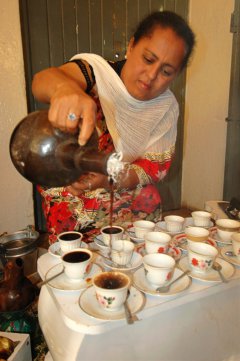
This is Ethiopian coffee. What could be more cultural than drinking coffee in the country of origin and ancient civilization?
This ritual of roasting, grinding, cooking and drinking has a history of thousands of years in Ethiopia. Whenever you finish eating at a restaurant in a small town in Ethiopia, you will have a cup of coffee like this. For a long time, it became a ritual. The coffee ceremony ceremony is part of Ethiopian life, and it takes 20 minutes to wait for a cup of freshly baked coffee after three meals. After drinking rich coffee with dregs, it is the perfect end of a meal.
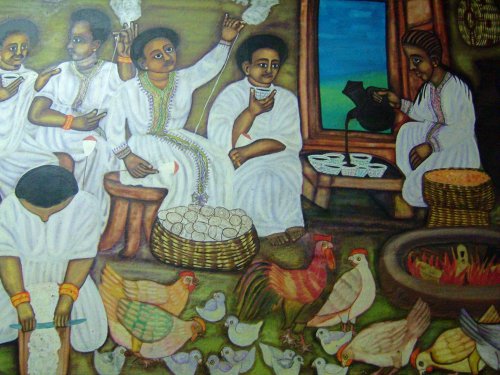
Paintings of coffee rituals (coffee ceremony) are often seen in Ethiopia.
Everyone talked about the weather, current affairs and politics, and the country's leaping future. No one cares whether this cup of coffee is Yega Xuefei or Sidamo, washed or insolated, deep-roasted or lightly roasted, and no one will plausibly say, "Coffee can't be roasted and ground and boiled, it's only dry." Coffee is a must, not a focus. In the country of coffee, there is no pressure to drink coffee, and there is no disdain for baristas to see someone with sugar and milk.
Drinking coffee is originally a very relaxed and enjoyable thing. Coffee break, doesn't it mean that the time of this cup of coffee can be temporarily cut off from annoying stress and anxiety? When I used to go to a cafe, I just sat down and said: American style, Cabo, latte, coffee will be on the table in about ten minutes. Now go to the cafe, sit down, and get the menu equivalent to looking at the wine list: the sun bourbon has a bright citrus taste, Kenya AA has malt acid. Usually after ordering the so-called "boutique coffee" menu, the time will slip away, and the brain will be hollowed out for a while by the literal words just now. When the coffee is served, you have to pretend with your friends like tasting red wine and say, "Yeah, it's so fruity."
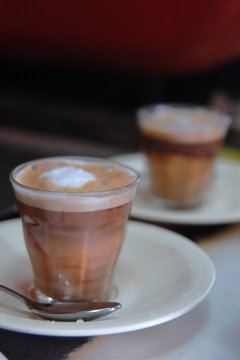
Since boutique coffee began to be popular in China, I sometimes feel that going to a cafe is a very tiring thing. Want to gossip about the lack of nutrition, but there are always people who want to discuss the roasting and cooking of coffee. Now people who go to boutique cafes are more likely to go on a pilgrimage to experience the craftsmanship of the world's number one barista and to taste the coffee flavor of winning the first prize. Drinking coffee becomes learning.
I believe that many coffee lovers have been fascinated by the book "ESPRESSO Italian Coffee Lab" and have found it incredible to do all kinds of experiments on coffee so scientifically and accurately. But now, the whole city is full of coffee labs, and cafes not only have to be stylish and stylish, but also boast of their own baking, and do everything on their own, except to grow their own-Oh, they may even go to the mountains of Yunnan to claim some coffee trees. Everyone studies coffee, but coffee is becoming more and more unfathomable. From the cafes in CBD to the mountains and forests in Xishuangbanna, drinking coffee is not only a national movement, but also a credit for national studies.
Every product has its own story and knowledge, and coffee is no exception. However, most of the time, guests may just want to have a cup of coffee and tell cold jokes about 543 with friends, rather than sharing them on Wechat moments through their mobile phones: today's rosy summer tastes so bright. As cafes in China become more professional, the relationship between people is becoming more and more alienated. People who don't like going to cafes may be because they can't stand the test of coffee and the crowded atmosphere of alienation.
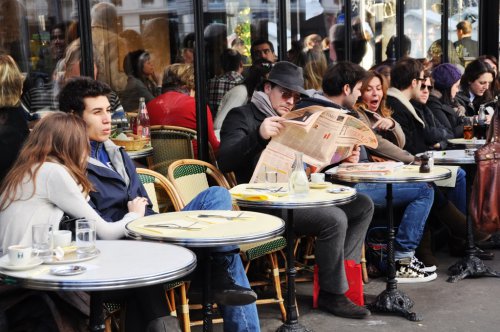
In the past, cafes were good places to see people and be seen.
Every time I pass by a super exquisite boutique cafe, it makes people look forward to a small town in Italy. As long as you stand at the bar and set up an euro, you can have a cup of coffee immediately. The clanking sound of cups and plates and the sharp sound of conversation are not only the smell of ordinary life, but also the smell of instant relaxation.
I want to stay in the coffee life circle, not the coffee lab.
END
Important Notice :
前街咖啡 FrontStreet Coffee has moved to new addredd:
FrontStreet Coffee Address: 315,Donghua East Road,GuangZhou
Tel:020 38364473
- Prev

Nespresso Coffee capsule turned into a bicycle? Coffee capsules can be recycled to help poor children go to school.
For more information on coffee beans, please follow the coffee workshop (Wechat official account cafe_style) Italian coffee machine company Nespresso partnered with Swedish bicycle manufacturer Vlosophy to make bicycles out of recycled coffee capsules. In the capsule coffee machine, which is popular in recent years, as long as the capsule is put into the machine, you can enjoy the fresh coffee in less than a minute. No.
- Next
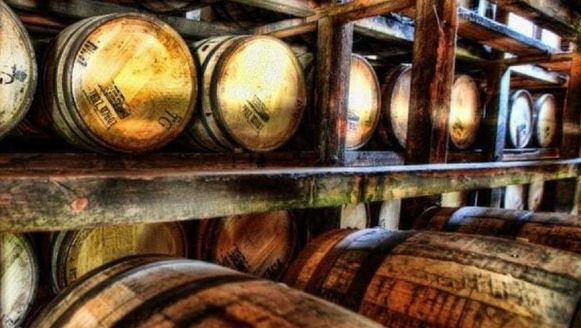
Is there wine in the coffee? [Honduras Shirley] try the new 50% discount! 50% discount on Jamaica Blue Mountain
Professional coffee knowledge exchange more coffee bean information please follow the coffee workshop (Wechat official account cafe_style) the last two activities with the Jadeite Manor blue and green mark to promote, originally in order this time is the red bid and bidding, but the beans are really too expensive and a little less, not enough for an event to place an order, interested fans in the city or to taste it! The following picture shows us tonight for the event.
Related
- The ceremony is full! Starbucks starts to cut the ribbon at a complimentary coffee station?!
- A whole Michelin meal?! Lucky launches the new "Small Butter Apple Crispy Latte"
- Three tips for adjusting espresso on rainy days! Quickly find the right water temperature, powder, and grinding ratio for espresso!
- How much hot water does it take to brew hanging ear coffee? How does it taste best? Can hot water from the water dispenser be used to make ear drip coffee?
- What grade does Jamaica Blue Mountain No. 1 coffee belong to and how to drink it better? What is the highest grade of Blue Mountain coffee for coffee aristocrats?
- What are the flavor characteristics of the world-famous coffee Blue Mountain No. 1 Golden Mantelin? What are the characteristics of deep-roasted bitter coffee?
- Can I make coffee a second time in an Italian hand-brewed mocha pot? Why can't coffee be brewed several times like tea leaves?
- Hand-brewed coffee flows with a knife and a tornado. How to brew it? What is the proportion of grinding water and water temperature divided into?
- What is the difference between Indonesian Sumatra Mantinin coffee and gold Mantinin? How to distinguish between real and fake golden Mantelin coffee?
- What does bypass mean in coffee? Why can hand-brewed coffee and water make it better?

